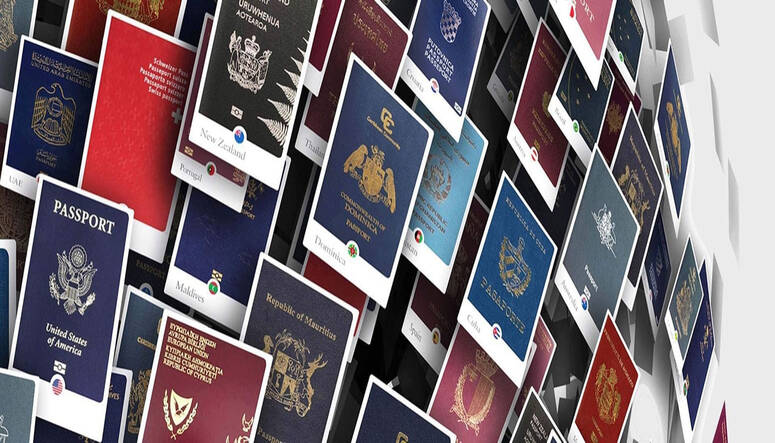US Passport Power Falls to Historic Low

Communiqué de Presse -
For the first time in the 20-year history of the Henley Passport Index , the United States no longer ranks among the world’s Top 10 most powerful passports. Once unrivalled at No. 1 in 2014, the American passport has now dropped to 12th place, tied with Malaysia, providing visa-free access to only 180 out of 227 destinations worldwide.
, the United States no longer ranks among the world’s Top 10 most powerful passports. Once unrivalled at No. 1 in 2014, the American passport has now dropped to 12th place, tied with Malaysia, providing visa-free access to only 180 out of 227 destinations worldwide.
At the top of the 2025 ranking — powered by exclusive data from the International Air Transport Association (IATA) — are Singapore (193 destinations), South Korea (190), and Japan (189). The Henley Passport Index ranks all passports based on the number of destinations their holders can enter without a prior visa.
A Decade of Decline
The US passport’s latest fall from 10th to 12th place stems from a succession of access losses. The end of visa-free travel to Brazil in April, combined with China’s exclusion of the US from its expanding visa-free list, marked the beginning of this downward trend. Subsequent restrictions from Papua New Guinea, Myanmar, and most recently Vietnam and Somalia further eroded the US score, officially pushing it out of the Top 10.
Dr. Christian H. Kaelin, Chairman of Henley & Partners and creator of the Index, notes:
The UK passport has experienced a similar decline, dropping from 6th to 8th place since July — its lowest-ever position — despite once holding the No. 1 spot in 2015.
Visa Reciprocity: The New Battleground
Although US citizens enjoy visa-free access to 180 destinations, only 46 nationalities can enter the United States without a visa. This places the US a lowly 77th on the Henley Openness Index, which ranks countries by how open they are to foreign nationals.
This imbalance between access and openness is among the widest globally — second only to Australia, and just ahead of Canada, New Zealand, and Japan. All five countries with this disparity have stagnated or declined in passport strength over the past decade.
According to Annie Pforzheimer, Senior Associate at the Center for Strategic and International Studies (CSIS) in Washington:
President Trump’s renewed visa restrictions have further strained global mobility, targeting 12 nations across Africa, the Middle East, and Southeast Asia, with additional limits on seven more. A USD 5,000–15,000 visa bond now applies to travelers from seven African states, refundable only upon departure, while a USD 250 ‘visa integrity fee’ and a near doubling of ESTA costs — from USD 21 to USD 40 on 30 September 2025 — highlight the US’s increasingly restrictive stance.
China’s Ascent: A Decade of Gains
In stark contrast, China has risen dramatically — from 94th place in 2015 to 64th in 2025 — expanding its visa-free access by 37 destinations over the past decade.
China has also climbed the Henley Openness Index, now allowing visa-free entry from 76 nationalities, 30 more than the US. New reciprocal agreements with Russia, Gulf states, South America, and several European countries have cemented China’s position as a global mobility powerhouse.
Dr. Tim Klatte, Partner at Grant Thornton China, comments:
Americans Lead the Global Rush for Second Citizenship
The shrinking strength of the US passport has triggered an unprecedented surge in residence and citizenship-by-investment applications. According to Henley & Partners, Americans are now the largest applicant group worldwide for investment migration programs.
By the end of Q3 2025, applications from US citizens had risen 67% compared to all of 2024, which itself saw a 60% year-on-year increase.
Dominic Volek, Group Head of Private Clients at Henley & Partners, explains:
Professor Peter J. Spiro of Temple University Law School adds:
About the Henley Passport Index (2025 Edition)
The Henley Passport Index is the original, most authoritative global ranking of all passports based on official IATA Timatic data — the world’s largest, most accurate database of international travel regulations. Developed by Dr. Christian H. Kaelin, it draws on 20 years of continuous research and is widely recognized as the standard reference for governments and global citizens.
About Henley & Partners
Henley & Partners is the global leader in residence and citizenship planning, operating over 70 offices worldwide. The firm pioneered the concept of investment migration in the 1990s and continues to advise both private clients and governments, having raised over USD 15 billion in foreign direct investment through citizenship and residence programs.
 , the United States no longer ranks among the world’s Top 10 most powerful passports. Once unrivalled at No. 1 in 2014, the American passport has now dropped to 12th place, tied with Malaysia, providing visa-free access to only 180 out of 227 destinations worldwide.
, the United States no longer ranks among the world’s Top 10 most powerful passports. Once unrivalled at No. 1 in 2014, the American passport has now dropped to 12th place, tied with Malaysia, providing visa-free access to only 180 out of 227 destinations worldwide.At the top of the 2025 ranking — powered by exclusive data from the International Air Transport Association (IATA) — are Singapore (193 destinations), South Korea (190), and Japan (189). The Henley Passport Index ranks all passports based on the number of destinations their holders can enter without a prior visa.
A Decade of Decline
The US passport’s latest fall from 10th to 12th place stems from a succession of access losses. The end of visa-free travel to Brazil in April, combined with China’s exclusion of the US from its expanding visa-free list, marked the beginning of this downward trend. Subsequent restrictions from Papua New Guinea, Myanmar, and most recently Vietnam and Somalia further eroded the US score, officially pushing it out of the Top 10.Dr. Christian H. Kaelin, Chairman of Henley & Partners and creator of the Index, notes:
“These small but cumulative changes have had an outsized impact, illustrating how finely balanced the global mobility landscape has become. The steady weakening of the US passport over the past decade is not just a reshuffle in rankings — it reflects a deep shift in global mobility and soft-power dynamics. Nations embracing openness and cooperation are surging ahead, while those resting on past privilege are falling behind.”
The UK passport has experienced a similar decline, dropping from 6th to 8th place since July — its lowest-ever position — despite once holding the No. 1 spot in 2015.
Visa Reciprocity: The New Battleground
Although US citizens enjoy visa-free access to 180 destinations, only 46 nationalities can enter the United States without a visa. This places the US a lowly 77th on the Henley Openness Index, which ranks countries by how open they are to foreign nationals.This imbalance between access and openness is among the widest globally — second only to Australia, and just ahead of Canada, New Zealand, and Japan. All five countries with this disparity have stagnated or declined in passport strength over the past decade.
According to Annie Pforzheimer, Senior Associate at the Center for Strategic and International Studies (CSIS) in Washington:
“Even before a second Trump presidency, US policy had turned inward. That isolationist mindset is now reflected in America’s loss of passport power.”
President Trump’s renewed visa restrictions have further strained global mobility, targeting 12 nations across Africa, the Middle East, and Southeast Asia, with additional limits on seven more. A USD 5,000–15,000 visa bond now applies to travelers from seven African states, refundable only upon departure, while a USD 250 ‘visa integrity fee’ and a near doubling of ESTA costs — from USD 21 to USD 40 on 30 September 2025 — highlight the US’s increasingly restrictive stance.
China’s Ascent: A Decade of Gains
In stark contrast, China has risen dramatically — from 94th place in 2015 to 64th in 2025 — expanding its visa-free access by 37 destinations over the past decade.China has also climbed the Henley Openness Index, now allowing visa-free entry from 76 nationalities, 30 more than the US. New reciprocal agreements with Russia, Gulf states, South America, and several European countries have cemented China’s position as a global mobility powerhouse.
Dr. Tim Klatte, Partner at Grant Thornton China, comments:
“Trump’s return to power has reignited trade and visa conflicts that weaken US mobility, while China’s strategic openness strengthens its global reach. These diverging paths are reshaping the future of travel and economic influence worldwide.”
Americans Lead the Global Rush for Second Citizenship
The shrinking strength of the US passport has triggered an unprecedented surge in residence and citizenship-by-investment applications. According to Henley & Partners, Americans are now the largest applicant group worldwide for investment migration programs.By the end of Q3 2025, applications from US citizens had risen 67% compared to all of 2024, which itself saw a 60% year-on-year increase.
Dominic Volek, Group Head of Private Clients at Henley & Partners, explains:
“Facing global uncertainty, wealthy American families are engaging in ‘geopolitical arbitrage’ — securing second residences and citizenships to diversify risk, safeguard mobility, and optimize their personal and financial freedom.”
Professor Peter J. Spiro of Temple University Law School adds:
“US citizenship remains valuable, but no longer sufficient on its own. Multiple citizenship is becoming normalized in American society. As one observer put it, ‘dual citizenship is the new American dream.’”


























Comments
0 de 0 commentaires pour l'article 316602